CLICK HERE for the latest market quotes from the Iowa Agribusiness Network!
CLICK HERE for the latest market quotes from the Brownfield Ag News Network!
CLICK HERE for the latest market quotes from the Iowa Agribusiness Network!
CLICK HERE for the latest market quotes from the Brownfield Ag News Network!
(Red Oak, Iowa) – Officials with ISU Extension and Outreach in Montgomery County say 4-H members, their families, and community members gathered November 17, 2024, for the annual Montgomery County 4-H Awards Night. The program was hosted by the 4-H County Youth Council, a group of 4-H members from across the county ranging in age from high school freshmen to seniors.
This year’s county council has nine members: Pace Chaillie (Grant Spitfires), Kennedy DeVries (Stennett Panthers), Oliver Dykes (Stanton Strivers), Landon Gigstad (Stennett Panthers), Kyla Hart (Stanton Strivers), Victoria McFarland (Stanton Strivers), Grace Nippert (East Sunrisers), Will Pollock (Stennett Panthers), and Delaney True (East Sunrisers). The council honored 4-H members and clubs from the past year for their hard work as well as outstanding program sponsors and extraordinary volunteers. 2024 Awards Night PR

2024-25 Youth County Council: Pace Chaillie (Grant Spitfires), Kennedy DeVries (Stennett Panthers), Oliver Dykes (Stanton Strivers), Landon Gigstad (Stennett Panthers), Kyla Hart (Stanton Strivers), Victoria McFarland – not pictured (Stanton Strivers), Grace Nippert (East Sunrisers), Will Pollock (Stennett Panthers), and Delaney True (East Sunrisers).
Four awards are given to adult volunteers, community members, or businesses who support and make positive impacts on the Montgomery County 4-H program. The Friend of 4-H award was given to Farm Credit Services of America. The Montgomery County Ag Society received the Honorary Award. The 2024 Outstanding 4-H Alumni was given to Jenny Ellis and Stephanie Vinton-Pollock of the Stennett Panthers and Red Oak Clover Kids was presented the 2024 Outstanding Leader award.
Volunteers are presented with tenure awards for every five years of service. Those honored on Nov. 17th were:
In addition to adult and community awards, youth members received awards for submitting their yearly record books and submitting their officer books. Members receiving an award for their record books were:
Junior Record Books: The Outstanding Junior Record Book was awarded to Reese Herzberg. Loryn Anderson, Lyssa Anderson, Anna Chaillie, Payton Doyle, Carter Taylor, Zane Johnson, and Lauren Ferree received certificates of completion.
Intermediate Record Books: The Outstanding Intermediate Record Book was awarded to Dalton Ferree.
Senior Record Books: The Outstanding Senior Record Book was awarded to Joshua LeRette. Receiving certificates of completion and senior project area awards: Lilly Anderson (Rabbit), Pace Chaillie (Sheep), Landon Gigstad (Dog), Joshua LeRette (Woodworking), Grace Nippert (Poultry), Alyssa Strebe (Photography).
Two clubs received awards for turning in their officer books. Grant Spitfires received a certificate of completion for their Secretary’s book, and Outstanding Historian Book and Treasurer’s book. Stanton Strivers received Outstanding Secretary’s Book.
Six senior 4-H members received additional awards based upon their 4-H participation and project involvement. To be eligible for a senior award, members must turn in a record book as well as meet other award specific criteria.
Service: Pace Chaillie & Grace Nippert
Livestock Achievement: Lilly Anderson
Achievement: Landon Gigstad
Danforth Award: Alyssa Strebe
Hall of Fame: Joshua LeRette
Congratulations to all the 4-H members and community partners who received an award! (See more pictures on the Montgomery County-IA Extension Facebook page)
(Article submitted by Katie Hart, Montgomery County ISU Extension/Outreach)
(Radio Iowa) – Iowa’s busiest and largest hunting seasons will be kicking off shortly, as the first of the state’s two shotgun seasons for deer will open in about two weeks. Nate Carr, an Iowa D-N-R conservation officer, says deer hunting is extremely popular. “We see roughly 100,000 hunters get out and participate in those two seasons, and during that time, we harvest about half of the total deer harvest in Iowa within a relatively short period of time,” Carr says. “So it’s a really effective way to manage our deer herd across the state, but also see a lot of good hunter participation.”
The first deer shotgun season runs December 7th through the 11th, while the second season runs December 14th through the 22nd. Deer hunters harvested about 60-thousand deer in Iowa last year, and Carr anticipates this year’s harvest will round out roughly the same. “Eastern, southern Iowa, we have really strong numbers and tend to have strong harvest, and so that kind of makes up for the lower population on the western side of the state right now, so it kind of balances out,” Carr says. “I think we’ll see decent numbers. Hopefully, we’ll get colder temperatures. That tends to get deer on their feet and motivate hunters to get out and pursue them.”
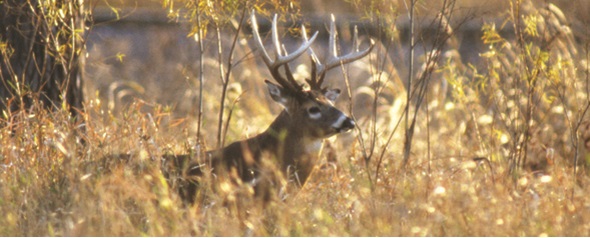
Iowa DNR photo
There have already been several smaller deer hunting seasons held in the state, and this year’s hot, dry weather may have been something of a hindrance. “We’re still seeing pretty decent harvest numbers. I think we’ve harvested around 25,000 deer throughout the youth season, in this early split of the archery season, as well as early muzzleloader, so we’re we’re on track,” Carr says. “We’re down a little bit, and you could probably attribute that somewhat to temperature, a little bit of hemorrhagic disease, which we’ve seen impact central Iowa quite a bit this year.”
Find much more information on the hunting seasons ahead at iowa-d-n-r-dot-gov.
Cass County: Corn $3.98 Beans $9.38
Adair County: Corn $3.95 Beans $9.41
Adams County: Corn $3.95 Beans $9.37
Audubon County: Corn $3.97 Beans $9.40
East Pottawattamie County: Corn $4.01 Beans $9.38
Guthrie County: Corn $4.00 Beans $9.42
Montgomery County: Corn $4.00 Beans $9.40
Shelby County: Corn $4.01 Beans $9.38
Oats: $2.65 (same in all counties)
(Radio Iowa) – A recent Iowa Farm Bureau report shows the Iowa ag economy has seen a down trend from 2023 into 2024 that lead to farm incomes dropping by nearly 25 percent. I-F-B’s economics and research manager Christopher Pudenz says there are some things that could turn the farm economy around. He says getting away from Farm Bill extensions to passing a new five-year bill is one. “One of those aspects that is in that farm bill that’s really important for farmers here in the state of Iowa is the crop insurance programs that are funded in part by the Farm Bill,” he says. Pudenz says the safety net it provides takes some of the uncertainty out for farmers.
“The vast majority of acres for both corn and soybean farmers here in the state of Iowa are covered under crop insurance. That you know really does help during a year like this, when prices are depressed compared to previous years, or like when those folks up in northwest Iowa had all the flooding this spring and wiped out all those acres,” Pudenz says. He says there are some bright spots going forward, including the international export market. “We are looking to have a pretty strong here in terms of corn exports, the beef market remains strong. Iowa is fourth for cattle on feed, and it’s looking like some of those revenues in that in that industry might be shifting to some of those cow calf folks,” he says. “The hog industry, after having a pretty rough stretch there 18 months or so has had a better summer and fall and is looking to have a better 2025.” Pudenz says some of those areas could get farm incomes up a again.
“If farmers have, you know, higher incomes, they can, they can start buying machinery again. And then those manufacturers can start buying, you know, tires from their tire suppliers. Just kind of kick start the whole ag and ag adjacent economy,” Pudenz says. Republicans took back the White House and the Senate in the recent election and that can also impact the Ag economy. Pudenz can’t say yet what that impact will be. “It’s just too early to tell. We don’t know who is going to be the U-S-D-A Secretary yet. We don’t have an announcement about U-S-T-R (US Trade Representative), eagerly awaiting those announcements as we go forward here,” he says.
Pudenz says these factors are all important as the I-F-B analysis shows the negative impact on the state’s economy from the downturn is more than one- and-a-half-billion-dollars.
(Iowa Capital Dispatch) – The Iowa Department of Agriculture and Land Stewardship announced the last seven agricultural drainage wells in the state have been closed, which represents the end of about 30 years of research and management around the wells that negatively impacted water quality in Iowa.
Following the establishment of the Iowa Groundwater Protection Act in 1987, IDALS developed an inventory of ag drainage wells in the state and found there were 300, with a majority in Humboldt, Pocahontas and Wright counties. Per the groundwater protection law, the department conducted research on ag drainage wells and in-field nutrient management plans that, according to IDALS had “statewide application in dealing with the water quality concerns about nitrogen and herbicide movement from cropped lands to Iowa’s streams and lakes.”
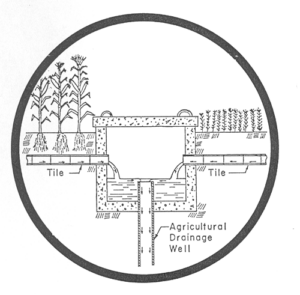
A schematic showing how agricultural drainage wells operated. (Graphic courtesy of Iowa Department of Agriculture and Land Stewardship)
Another element of this research found that wetlands could remove up to 90% of nitrogen and herbicides from tile drainage. Drainage from the last seven ag drainage wells, all near Gilmore City, will be redirected to a 137-acre wetland to help manage water quality of the runoff. “Improving water quality takes time, commitment, and dedicated funding, but this demonstrates that when there is a strategy and funding in place, this impactful work can get done successfully,” Iowa Secretary of Agriculture Mike Naig said in a news release.
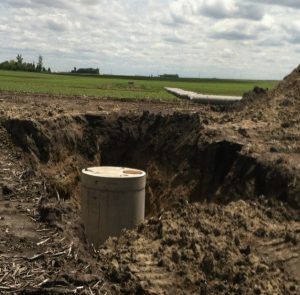
Closed agricultural drainage wells have a cover like this. (Photo courtesy of Iowa Department of Agriculture and Land Stewardship)
Michael Schmidt, staff attorney for the Iowa Environmental Council, said the issue of ag drainage wells has been part of the council’s priorities since it started in 1995 and advocated for the 1997 law that required the closure of the wells. In areas prone to excess water, cropland will have tile, or underground drainage structures, to help drain water out of the fields and into ditches or streams. Ag drainage wells would funnel water from the tile down into bedrock aquifers, meaning any ag chemical or excess nutrients from that field would flow down into aquifers, many of which were also used for drinking water.
Most of these wells were constructed in the early to mid-1900s, and according to the U.S. Environmental Protection Agency more than 95% of all agricultural drainage wells in the country were in Iowa, Idaho, Ohio, Minnesota and Texas. To date, IDALS has made use of $25 million in state appropriations and an additional $12 million in landowner and partner contributions to close nearly 200 of these wells. The other third of the 300 identified wells were closed by landowners or were non-functioning. Landowners were also eligible for assistance to close the wells from the Watershed Improvement Review Board.
The final seven wells were closed on Tuesday, following six years of planning and construction around the closures, which according to IDALS, involved eight properties and 13 landowners. Schmidt called the effort a “big step forward” in addressing some of the major ground water pollution issues in the state.
(Radio Iowa) – Judges on a federal appeals court in Omaha have quizzed an attorney representing two Iowa counties AND the attorney for Summit Carbon Solutions, which is asking the court to nullify pipeline zoning ordinances. An attorney for Shelby and Story Counties argued federal law gives the U-S Transportation Secretary jurisdiction over safety standards — but he said states and counties have jurisdiction over the location and routing guidelines for hazardous liquid pipelines. One judge asked about references to safety in Shelby County’s ordinance. The attorney replied that a safety standard is different from a safety concern.
The attorney for the pipeline company argued setback zones around homes, hospitals and schools in Shelby and Story County are clearly safety standards. Summit’s attorney also noted the ordinances were filed a year after the company applied for a state construction permit. He said if the federal appeals court upholds the ordinances, counties will be able to keep changing the rules for the pipeline route.
As for Story County’s rewritten ordinance — saying it was for the protection of economic development — Summit’s attorney said it’s implausible to argue there could be economic development activity in the 13-hundred feet around a farmhouse in rural Story County. When a judge on the panel suggested farming is economic development, Summit’s attorney said you can farm over the top of the buried pipeline.
(West Des Moines, Iowa) – Officials with the Iowa Farm Bureau said Tuesday, a sharp downturn in the agriculture economy is causing a ripple effect throughout the state resulting in the loss of up to 11,400 jobs and $1.5 billion in value-added economic activity (GDP) and a $100 million loss to the state and local tax base. The data comes from an exclusive Iowa Farm Bureau Federation (IFBF) economic analysis, and says 23 businesses in Iowa announced layoffs for 4,097 individuals working in production agriculture and adjacent industries from the first of the year through Sept.18, 2024, but IFBF’s analysis finds those numbers balloon when taking broader impacts into consideration.
IFBF economics and research manager Christopher Pudenz says “Ultimately, this starts with depressed incomes at the farm gate that have ripple effects on the Iowa economy,” said Christopher Pudenz, Iowa Farm Bureau economics and research manager. “For example, because farm incomes are down, farmers aren’t making the same machinery purchases they’ve made in previous years which means manufacturers, suppliers and retailers slow down production and are forced to lay people off.”
Iowa’s ag-related layoffs have occurred during a prolonged period of economic hardship and uncertainty for farmers. USDA’s September 2024 farm income forecast projects another challenging year for farmers, who are expected to lose nearly a quarter of their income in just two years due to slumping commodity prices and stubbornly high input costs. Net farm income, a key measure of profitability, is projected to decline 4.4% from 2023, following a record year-over-year drop of 19.5% from 2022 to 2023.
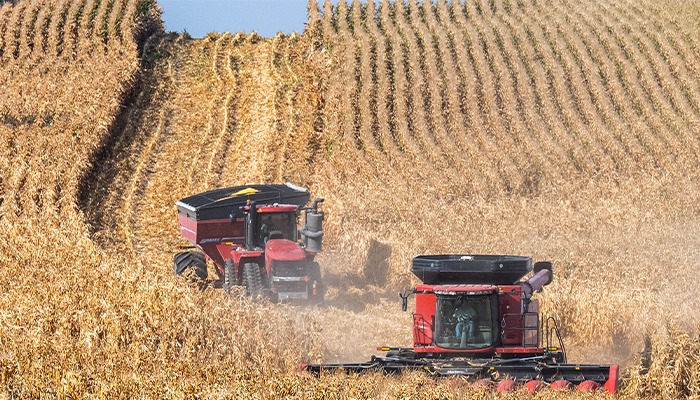
IFBF photo
Pudenz said that the downturn is particularly impactful in Iowa, considering agriculture accounted for more than 22% of Iowa’s total economic output in 2022, according to a study commissioned by the Coalition to Support Iowa’s Farmers. Nearly one in every five Iowans are employed due to agriculture and ag-related industries, accounting for more than 385,000 jobs. “Agriculture is the heartbeat of the Iowa economy, and when agriculture struggles, those pains are felt throughout the state,” Pudenz said.
IFBF President Brent Johnson says “This analysis underscores why a farm bill is so important – farmers need assurances as they try to balance economic uncertainty. A farm bill extends beyond the farm and protection of our food supply; it also provides access to nutritional programs for families facing hunger, advances conservation efforts and spurs innovation through research. If a new farm bill isn’t passed, many critical programs will face significant interruptions.”
(Atlantic, Iowa) – Cass/Guthrie County Environment Health Executive Director Jotham Arber, Tuesday, presented his monthly report to the Cass County Board of Supervisors. In his report, Arber said the main thing he wanted to note, is “This weird thing going on with a few septic systems” in Audubon and Cass Counties.
He said there are around 9 or 10 septic systems that have the same weird, greasy substance. He said in Audubon County, the septic systems were installed by the same contractor, but in Cass County there were four different contractors, so it doesn’t appear to be an installation issue. Samples will be taken and sent to the State Hygienic Lab for breakdown and analysis, so see if there are commonalities in the substance.
Jotham Arber said also the Environment Health Department is finishing-up water test sampling in Cass County. The test results will be analyzed and made available during the Board of Supervisors meeting in December.
He said there has been a huge increase in people who are taking the opportunity to contact the EHD and getting their private wells rehabbed. That’s something he’s happy to see.
By “rehab,” he means those wells that were installed more than 40-years ago, both shallow and deep, that used technology that incorporated bricks, and which deteriorates over time, as well as those where the pumps ave gone bad, etc. Those issues can be corrected allowing the wells to be accessed safely.
He said “A lot of folks want to keep their wells, and if we can help them keep it, it’s not bad to have good drinking sources of water.” Arber said also, they’ve seen an increase in the number new wells being drilled in Cass County. Most of the newer wells are drilled deep, because more is known now about nitrates and how to make those wells more secure from bacteria.
The Environmental Health Department, he says, can help property owners better position new wells that are less prone to run-off, and in incorporating better structural features.
(Iowa News Service) – A nonprofit group that tracks oil and gas development has created an interactive map to show how close CO2 pipelines in Great Plains states come to environmentally and ecologically sensitive areas. The map includes Indigenous land that hasn’t been included in similar previous projects. 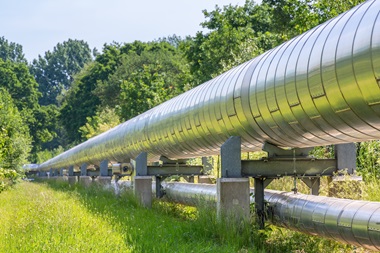
Ted Auch, Midwest program director for the FracTracker Alliance, said it focuses on Indigenous areas but goes further, showing in detail how close proposed CO2 pipelines would come to soybean and ethanol facilities, for example, but also to private land. He said the interactive map is an improvement over existing ones.
“Which is to say that you could look at it as a static image, but you can’t interact with or manipulate the data in terms of, like, scrolling in, scrolling out, finding addresses – you know, that kind of thing,” said Auch. “It’s available as a PDF or a JPG. So, what we’ve done is, we’ve taken that stuff and we’ve digitized it and we’ve included it on this map, so that people can actually – spatially and in real time – interact with the data itself.”
The Great Plains Action Society says CO2 pipelines pose risks that disproportionately affect Indigenous communities and people of color. Auch said FracTracker is working on another version that takes a deeper look at the proximity of pipelines to the Winnebago reservation south of Sioux City. Energy companies say the pipelines are a safe and effective way to capture carbon from industrial processes, and store it underground, reducing greenhouse gas emissions.
Auch said the interactive map will give farmers and other landowners near the proposed pipelines what they need to understand what’s happening on their land, leveling the information playing field with corporate interests. “You have these large, multinational corporations, and then on the other side of the ledger are small, medium-sized frontline or Indigenous groups that either have small budgets or no budgets,” said Auch, “and don’t have the capacity, the time, or the expertise to develop maps to inform their organizing activism or advocacy.”
The Eighth Circuit Court of Appeals in Omaha is making a livestream available as it hears oral arguments today in a case involving Iowa landowners affected by CO2 pipeline proposals, some of whom face seizure of their property by eminent domain if the Summit Carbon Solutions project moves forward.
The Iowa DNR is seeking campground hosts for the 2025 camping season. If you enjoy camping and meeting new people, this may be the perfect volunteer opportunity for you.
Campground hosts work alongside DNR staff to help clean and beautify the park, ensure reservations are up-to-date and accurate, and assist visitors in a welcoming and helpful manner. Actual duties vary based on each park’s individual needs.
In this volunteer position, hosts are provided a free campsite and live in the park for one to five months during the summer season. Hosts volunteer a minimum of 20 hours per week, often including weekends and holidays, while living on site in their own camper.
Each park’s camping experience is unique – some are rural and rustic, others are in popular tourism areas; some have small campgrounds, and many are hubs of activity, especially on peak weekends. In addition, assigned lengths of stay are dependent on each park’s needs for the upcoming season.
Parks currently needing hosts:
To learn more about a park’s unique experience and needs, please contact the individual state park office; a list of parks and their contact information can be found at www.iowadnr.gov/stateparks, or for general inquiries about campground host opportunities, email: iowa.stateparks@dnr.iowa.gov
Additional information about volunteering and applying for a campground host position is available at www.iowadnr.gov/volunteer. The list of parks needing campground hosts can change, so please check back to this web page regularly for additional opportunities.